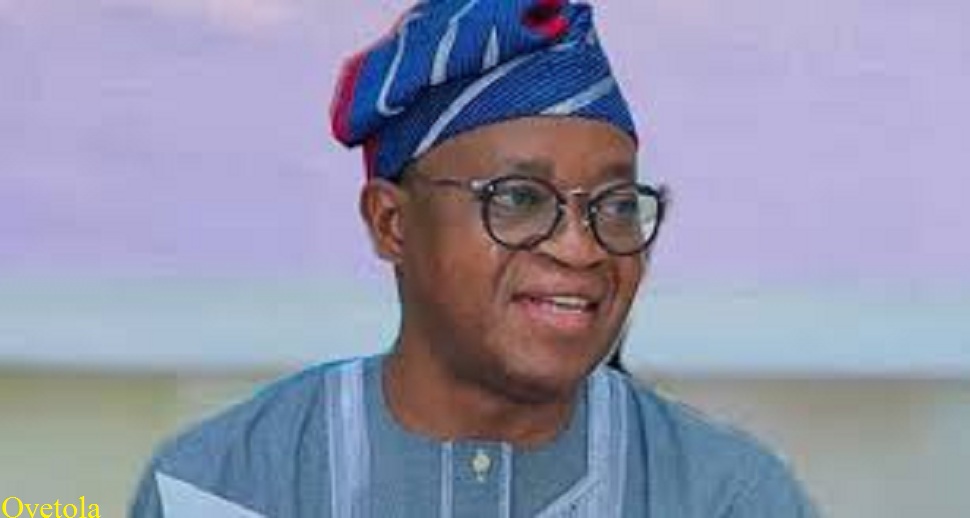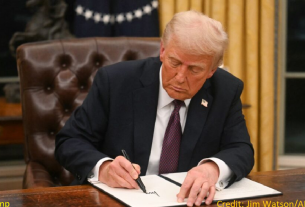By Ropo Sekoni
The response of the Federal Government with the establishment of community policing even though desirable, is still considered inadequate because it is still controlled from the centre. Many Governors have registered this inadequacy by establishing their own security agencies to assist the police. There is no doubt, however, that until governors are allowed to control the security apparatus of their state, we are not likely to have improved security in the country… The nation’s security agencies are presently constituted are too centralised and too far from the grassroots to adequately provide the required security for the nation – Gboyega Oyetola, Governor of Osun State
Therefore, the state government has no choice but to shed some weight and reduce the size of the public service. It is a painful but necessary step to take, for the sake of the majority of the people of this state…The public service of the state with less than 100,000 employees and their families) cannot be consuming more than 90% of government resources, with little left to positively impact the lives of the more than 9 million that are not political appointees or civil servants. It is gross injustice for such a micro minority to consume the majority of the resources of the State-Nasir el Rufai, Governor of Kaduna State
In federations, subnational leaders (governors, premiers) and leaders of national government in a federation are coordinates, with the former not being subordinates of the latter. When national and subnational leaders in a federation recognize that they lead two political spaces that share sovereignty, it is possible for state governors to have and announce visions or ideas that are at variance with what national presidents offer or prefer. The kind of rare frank talk from two of the country’s governors recently may signal hope, faster than ever, in the sustainability of federal governance. Such public discussions from governors allow all stakeholders to hear directly from the horse’s mouth.
A few days ago, the governor of Kaduna State at home in Kaduna and his Osun State counterpart at a lecture organized by Sultan Maccido Institute for Peace, Leadership and Development Studies at the University of Abuja, made statements capable of raising the hope of citizens that ‘the president is always right’ attitude of lawmakers and governors should also and always be context-specific. Both governors, for different reasons, raise pertinent issues about the country’s federal system, especially in terms of management of a federation’s security and economic challenges.
In a lecture that focused on the role of traditional rulers in fostering security, sustainable development, and good governance in Western Nigeria, Governor Gbenga Oyetola built a case that an effective security of lives and property of citizens is inevitable to good governance at any level, more so at the grassroots level where citizens live, work, farm, and relax.
By providing a strong argument for the importance of devolution of law enforcement and maintenance of public order to the subnational level, that in addition to whatever form of national police the federal government may desire, nothing should preclude subnational governments in a federation—ethnic or territorial—from operating subnational law enforcement systems.
Oyetola’s view that a community policing initiative under the control of the central government is starkly different from subnational policing required by federations provides an important argument that has been missing in response to the central government’s community policing initiative. He used the country’s experience of insecurity as an illustration that the political autonomy of subnational units in a federation is violated to the detriment of the entire country.
Similarly, Governor el Rufai addresses an area of governance that is central to development of subnational governments and delivery of the common good to citizens. The core of el Rufai’s argument is that nothing is right about a federal system in which subnational units cannot do more than pay monthly wages and salaries from money available to them each month. The governor has turned what used to be side talks within states to calm nerves of citizens who complain about lack of development within states into a national debate on the need for a new post-oil economy that should not have arisen at all, were the government of the country not in the hands of military dictators at critical moments in country’s history.
In the past, just about every governor had complained privately or to their electors that federal allocations are hardly adequate to do more than paying salaries in their respective states, but el Rufai has made, though somewhat melodramatically, a strong case for a national debate on the imperative of fiscal federalism. In a manner that provides facts and figures to support his claim about a monthly allocation of, for example in November 2020, N4.83bn out of which salaries gulped N4.66bn with a balance of only N162.8m, the Kaduna governor has painted a gloomy picture about prospects of any effort to address projects that can improve the lives of citizens in a subnational economy sewn only to transfers from the national to the subnational level. The two issues—proper security architecture by Oyetola and proper fiscal federalism from el Rufai—would in other climes have been open policy discussions at the level of the ruling party of which both governors are members. But the body language of President Buhari, regardless of his manifesto in 2015 to devolve powers to subnational governments, has been consistently against sharing of power with subnational governments that was in vogue before the coming of military rulers into the country’s political development.
The significance of the two governors to kickstart a national debate on security and economic reform or restructuring suggests that it is not too late yet for the APC government of President Buhari to listen to citizens’ concerns and worries. It is logical to believe that the positions of the governors on re-inventing the country are concerns that emanate from the experience of citizens in their states. If Nigeria were a normal knowledge economy, there would have been many studies on effects of insecurity in the last few years on economic productivity and on why subnational governments have difficulties raising their internally generated revenues, aside from periodic calls from federal officials on states to increase their IGRs.
As governors are entering into open debate about how to make their job governing states meaningful to citizens, the federal government ought to get excited about using, among other things, the remaining part of the APC federal government to liberate the country from decades-old narrow vision of governance that had prevented many leaders to see the danger in sticking to the country’s undemocratic past. It was the era of military rule that pushed the country into much of the social and economic problems citizens now endure. When General Buhari promised in 2015 to re-federalize the country, many stakeholders thought the era of reinventing the country was on the way.
To borrow the phrase of the last Black Lives Matter demonstration in the United States, there is no need for the central government to continue to put its knee on the neck of subnational governments under the system of monthly transfer of funds from the federation account to states while also taking from subnational governments resources that can lead to additional prosperity. We started Nigeria’s federalism with a system in which subnational units funded the federal government and the experience was positive at that time. It is the military government’s obsession since the civil war with the theory of even development fueled by abundance of petrodollars that turned Nigeria’s federal system into its current centralized or unitary form.
Be it in security or economy, the evidence is unmistakable that de-federalization of Nigeria for the past 50 years has not yielded the success its military authors expected, because the policy of central ownership of all resources—minerals, taxation including sales tax paid by consumers in specific states, or central control of law enforcement—has not achieved development in relation to Nigeria’s peer countries, nor has it achieved security of lives and property and genuine feeling of sense of belonging by citizens across the federation, alias, national unity. Nigeria has never been so divided as it is today, not even at the time of the civil war.
It is salutary that some governors are reminding citizens that Nigeria and Nigerians deserve a new mode of thinking that is different from what was in vogue under military rule. And it is fit and proper that leaders of subnational governments are ready to respond to the culture of change and innovation that federal democratic governance demands. It is time to listen to governors who are speaking up.
The Nation







